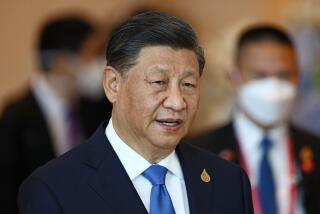Timing of Nuclear Talks Up to N. Korea, U.S. Official Says
- Share via
BEIJING — The timing of a new round of talks over North Korea’s nuclear weapons program is in the hands of the isolated Asian nation, Deputy Secretary of State Richard L. Armitage said Friday.
“The decision on the dates is in Pyongyang, not in Beijing, so you would have to ask the North Koreans,” he told reporters.
Armitage, speaking after a day of meetings with Chinese political and military leaders, said there was no single impediment delaying the North Korea talks. The second round of six-party negotiations, originally set to begin last month, would involve the United States, China, Japan, Russia and North and South Korea.
“I don’t know if there’s any one particular issue I’d put my finger on as a sticking point,” he said. “It’s just the general difficulty of herding six of us in the same direction at the same time while simultaneously dealing with what is clearly a legacy of suspicion” in North Korea.
Early this month, North Korea said it was willing to end its nuclear arms program in return for political and economic concessions from the United States.
Armitage added that there was some evidence North Korea’s economy was improving, albeit modestly, with recent visitors observing more economic activity in Pyongyang, the capital.
“But whether that extends to the rest of the country is certainly rather doubtful,” he said, citing the World Food Program’s recent appeal for large quantities of food aid.
Turning to another area of potential instability in East Asia, the diplomat said Washington remained committed to maintaining the status quo between China and Taiwan.
Armitage questioned the reasoning behind a March referendum proposed by Taiwanese President Chen Shui-bian. Under the proposal, Taiwanese voters would be asked whether their government should purchase advanced antimissile systems if Beijing refused to dismantle hundreds of ballistic missiles based along the Taiwan Strait and whether the island should try to negotiate a “peace and stability framework” for relations with the mainland.
“As I understand it,” Armitage said, “referendums are generally reserved for items that are either very divisive or difficult, and the wording I’ve seen in the referendum seems to be neither divisive nor difficult.”
The administration is still studying the referendum’s language and its context, Armitage said, with an eye to the election and its domestic impact.
“You have to ask the leader of Taiwan what he thinks the message is,” he said. “There is an election campaign going on. That might have something to do with it.”
Beijing views Taiwan as part of China and is critical of the referendum and any move by the island to assert its independence.
In his meetings with Chinese officials, Armitage discussed bilateral relations, global security and the situation in Iraq, in addition to Taiwan and North Korea. North Korea has said it has a nuclear weapon, Armitage said, and should be taken at its word. “I do not think they are” bluffing, he added.
More to Read
Sign up for Essential California
The most important California stories and recommendations in your inbox every morning.
You may occasionally receive promotional content from the Los Angeles Times.










